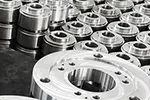CNC machining

CNC Turning
High precision and accuracy
Wide range of materials

CNC Milling
Enhanced design flexibility
Improved surface finish

CNC Drilling
Multiple hole sizes and depths in different materials

CNC Machining Center
Comprehensive
Reduced waste and costs
CNC machining (Computer Numerical Control machining) is a manufacturing process where pre-programmed computer software controls the movement of machinery and tools to precisely shape, cut, or form materials like metal, plastic, or wood into custom-designed parts. It converts digital CAD (Computer-Aided Design) models into G-code instructions, directing the machine's axes (e.g., X, Y, Z) and parameters (speed, feed rate) to execute operations such as milling, turning, drilling, or grinding. Key advantages include high accuracy (tolerances within ±0.001 mm), repeatability for mass production, and the ability to create complex geometries. Widely used in aerospace, automotive, medical, and electronics industries, CNC machining supports diverse materials, from metals like aluminum and titanium to plastics and composites, while requiring minimal manual intervention once programmed.
CNC machining is widely used due to its precision, efficiency, and versatility. It enables the production of complex, high-tolerance parts (within ±0.001 mm) that manual machining cannot achieve, ensuring consistency across large batches. Automation reduces human error, speeds up production, and supports diverse materials like metals, plastics, and composites. Its flexibility allows rapid prototyping and customization while maintaining repeatability, making it ideal for industries like aerospace, automotive, and medical devices. CNC systems also minimize waste through optimized toolpaths and are compatible with advanced software for real-time adjustments, ensuring cost-effectiveness for both small-scale and mass production.
Common metal materials suitable for CNC machining include aluminum (e.g., 6061, 7075 for lightweight, corrosion-resistant parts), stainless steel (e.g., 303, 304 for strength and corrosion resistance), carbon steel (e.g., 1045 for structural components), brass (for electrical/decorative parts due to machinability), titanium (high strength-to-weight ratio for aerospace/medical use), and copper (excellent conductivity). These metals balance machinability, durability, and performance, making them ideal for precision parts in industries like automotive, aerospace, electronics, and machinery.
CNC Machining industry applications

electronics
The electronics industry utilizes CNC machining for manufacturing components such as heat sinks, connectors, and enclosures. The precise machining of these parts is crucial for ensuring proper electrical conductivity, heat dissipation, and protection of electronic devices. CNC - machined enclosures can provide a high - quality finish and accurate dimensions to house delicate electronic components.

Aerospace Industry
In the aerospace sector, CNC machining is used to produce a wide range of components, including turbine blades, engine parts, wing spars, and landing gear components. The high precision and repeatability of CNC machines are crucial for ensuring the safety and performance of aircraft. For example, turbine blades are machined with extreme accuracy to optimize airflow and fuel efficiency.

Automotive Industry
The automotive industry relies on CNC machining for manufacturing engine blocks, cylinder heads, transmission components, and various chassis parts. CNC - machined parts offer better dimensional accuracy, which leads to improved engine performance, reduced emissions, and enhanced overall vehicle reliability. Additionally, the ability to produce complex geometries allows for the creation of lightweight and efficient components.

General Manufacturing Industry
CNC machining is also widely used in general manufacturing for producing a variety of components, such as gears, shafts, and brackets. The flexibility and precision of CNC machines make them suitable for producing both small - batch and large - volume parts, meeting the diverse needs of different manufacturing applications.
Our Workshop

CNC milling machine

Worker operate the CNC machine

CNC machine workshop
